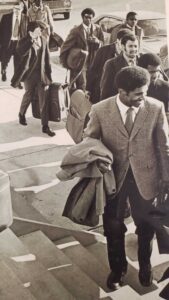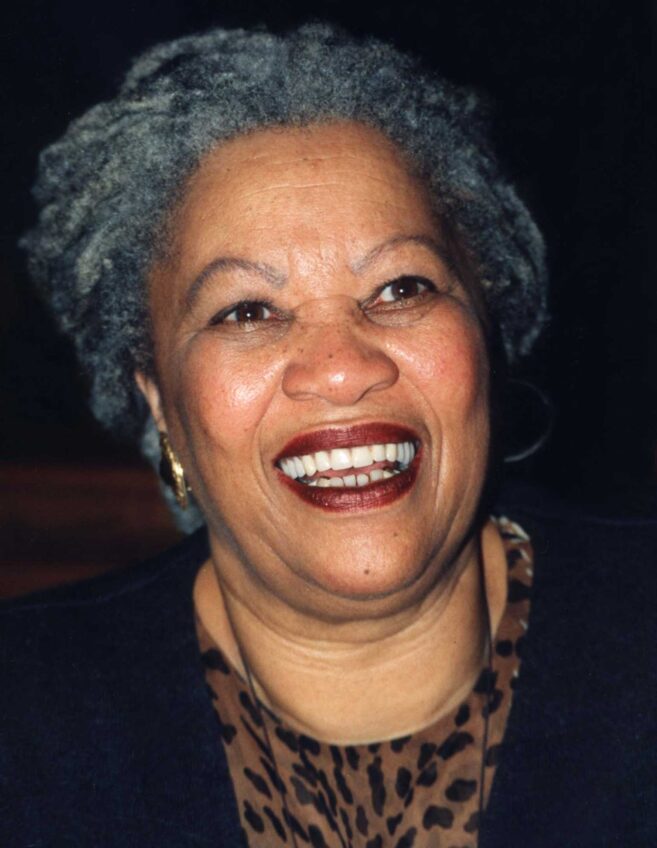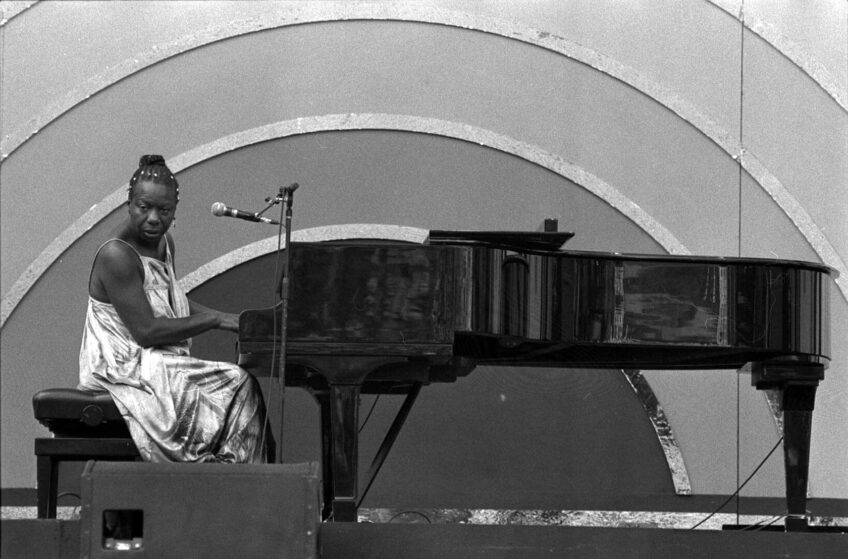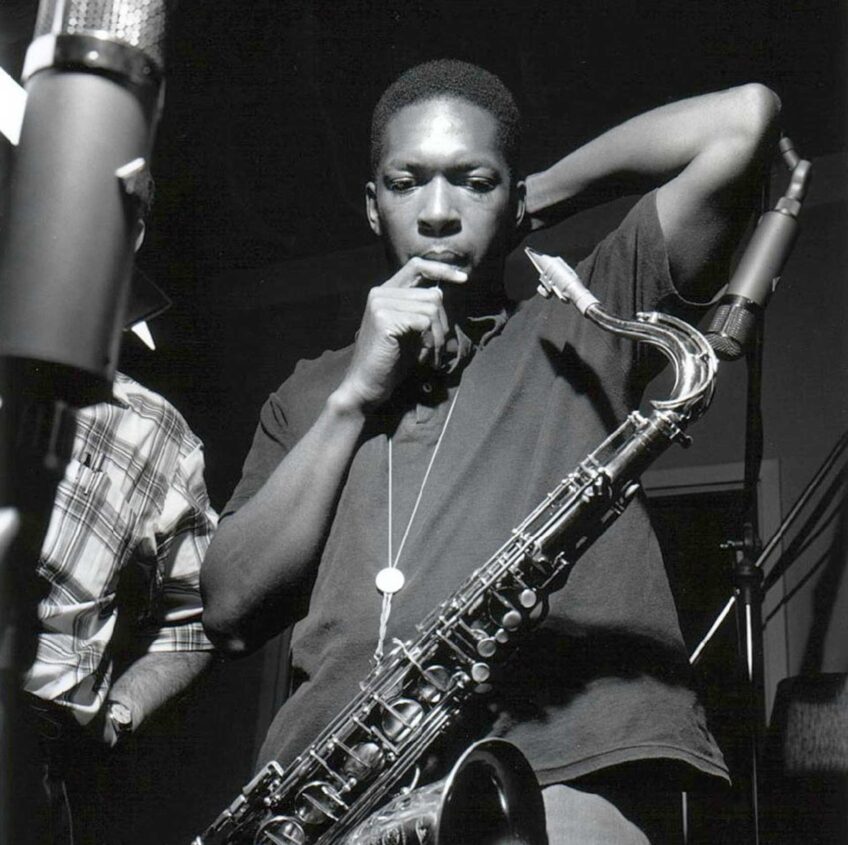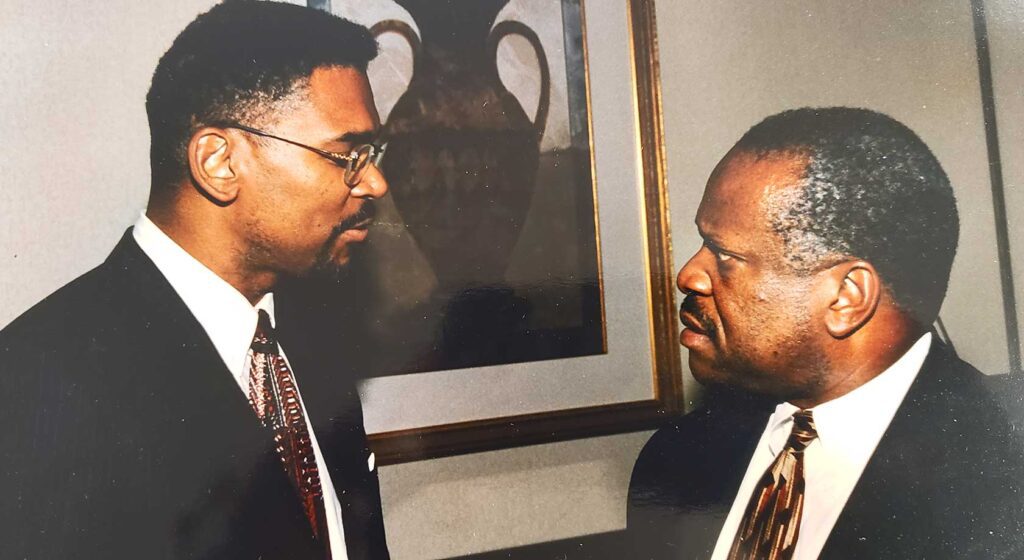
Editors’ note: This letter from Eddie Jenkins to Supreme Court Justice Clarence Thomas, shared with the Banner by Jenkins, has been lightly edited for style and to eliminate footnotes, which appear here as bracketed additions instead.
Dear Justice Thomas:
I am writing you and not the other Supreme Court Justices who now form your “pack” [of conservatives] because they could never understand what it means to be Black in America, but I know you have before. As Paul Lawrence Dunbar wrote, “We all wear the mask that grins and lies ….” Dunbar’s message is that as Black people, we are often forced to become double-minded and not show our real face to America to survive. I knew you before you were “masked” [in a deceptive disguise]. I knew you as “Couz.” We met at Holy Cross College prior to our attendance. There had never been more than two Blacks admitted to Holy Cross in one year. So this admission in 1968 of 20 Black students was nothing less than an act of humanity by Father Brooks, who [was] demonstrating the goodwill of Jesuit values and a prescient understanding of how Holy Cross would benefit from admitting Black students.
Father Brooks boldly recruited many of us without a financial commitment from Holy Cross trustees. This goodwill also formed robust recruiting initiatives in education and business and ushered in a social peace that gave hope to a new class of Black and Brown people who would be able to make a down payment toward the elusive American Dream. Many of our parents had served in the military and others had been a part of the Great Migration, but this was the first chance that their children would obtain the education and tools to be innovators and leaders in industry, education, housing, and medicine. You and I, and many of our Black classmates became pioneers in that first class of beneficiaries. When these voluntary practices became legal obligations for “Black and Brown people,” they called it “affirmative action.” Affirmative action was not new to Americans. It had been used in civil service, union membership, and legacy admissions in schools, housing, and jobs for white people. How did our white classmates at Holy Cross receive us? They [college officials] never asked us how we would feel about a white roommate but asked white students if they would mind a Black one. Clearly, “White Fragility” [the title of a 2018 book] was alive and well in 1968. We dared anyone to treat us as inferior as we would redress them not only in English but in French, Latin, or Greek.
You and I would connect after class, sometimes sitting on a hill and imagining with our new tools what pathways, roles, and responsibilities would be thrust upon our shoulders in this new world of opportunity. We discussed how far behind slavery and Jim Crow had deprived us of the essential capital, wealth, skills and tools to compete in America and how we could use education, politics and racial economics to not only survive, but prosper.
These conversations were happening among Black students all over America. There was ever present a song in our hearts, “Who is gonna take the weight?”
You had your grandfather’s “bootstrap” stories of engaging in hard work. It was a philosophy made popular by Booker T. Washington. We became curious about other national strategies beyond “passive resistance” and mass demonstrations. We were swept up by Malcolm X’s speeches, intrigued with Minister Louis Farrakhan and the Nation of Islam’s “Do For Self” program. We put into practice the Black Panther Party Free Breakfast Program and fed many of Worcester’s children, Black and white.
Justice Thomas, you were concerned about the safety and treatment of Black women on campus and penned a poem, “Is you is or is you ain’t a Brother.” In other words, we must protect our Black women. Just when we thought you had become radicalized, you argued against us (Black students) forming a Black Housing Corridor. You stated, “Why did we come all this way to Holy Cross to segregate ourselves?” We answered that, “Don’t white students congregate and live with each other, and no one ever cites them as being segregationists? People just want to be comfortable where they live.”
When Black students were expelled for blocking General Electric recruiters for the Vietnam War industry and white students were given a pass, Black students decided to leave in protest and give up our scholarships. You were skeptical and asked if this was going to advance our long-term goals because our parents had worked so hard to get us here and we would be giving up our scholarships. We answered that taking a stand on principles of equal justice will always be the correct path, regardless of the consequences. The next day you were leading the “walkout” off campus and were dressed in a Black Panther beret. Many of the Black students, especially from the South, loved your passion for argument, even though as a contrarian you would pick a side and change at a drop of a dime. They rewarded you by electing you president of the Black Students Union (BSU) over the leader who led us during the “walkout.” You later graciously declined to serve, knowing “this leader” deserved to be our president. You showed magnanimity. That’s the Clarence Thomas I knew at Holy Cross, and everyone wants to know what happened!
Clues are often hidden in the subconscious, but there was a reveal of your philosophy before you graduated. Clarence you and I were both English majors but never had an opportunity to attend class together until Holy Cross brought in its first Black English professor, Alvin McLean, to teach Black literature. McLean was one of the spoils of victory from our “walkout.” We discussed Black poets, and among their works was Claude McKay’s “If We Must Die,” “I too am America” by Langston Hughes and “Yet do I Marvel” by Countee Cullen, but the most soul-searching question developed in class was “Is a Black writer who writes poetry a poet or a Black poet?” McLean went on to explain that a Black poet would often express issues and injustices occasioned by people within the Black experience. His (Black poets) literature is often minimalized in libraries and bookstores, often categorized as Black literature. A poet, on the other hand, is free to write unburdened by race or racial identity. He or she is celebrated as an American. They do not shoulder the travails of Black people or their history. They are self-defined and free.
In a free society, everyone has the right to choose whether they should shoulder the burden of their family, group or self-perceived “people.” There, however, is always the moral (Biblical) reference “to whom much is given much will be required.” Clarence, you voiced your support for being just “an artist.” You had a vision for yourself to be unencumbered by your history, race and wealth. You were now free. With your newfound wings, I can only imagine how burdensome Yale Law School must have been to even consider you to be handicapped with a label of an “affirmative action baby,” but soon you would find your philosophy, which would support your story that you did it by yourself. But contrary to your later narrative, your boots had zippers, as you found a mentor and godfather in Sen. John Danforth.
We connected again on Capitol Hill when you were working for Sen. Danforth, and restarted our friendship through Gil Hardy. Gil, also a Holy Cross classmate, was your connector to Anita Hill. We would get together socially but there was something different about you. You never wanted to join the others but would stand outside and participate in the gospel according to fellow Black conservative Thomas Sowell.
I often listened countless times to your criticism of how the Brown vs. Board of Education case was wrongfully decided. Interestingly enough, you ignored the disparate resource allocation between Black and white public schools but focused on the Black-and-white doll experiment wherein the Black child chose the white doll [in the test conducted by Kenneth and Mamie Clark].
You thought that there was little or no psychological impact, which was an early indication of your seemingly race-neutral blinders.
You told me and others you were the “anointed one,” the next one up by the Bush administration, and for the first time I wondered if Black and Brown Americans’ hope for equality was now in your hands.
When you were nominated, I gave you the benefit of the doubt by publicly stating that although you were a conservative, you would be like Freeman, the character in Sam Greenlee’s [book], “The Spook That Sat By The Door.”
Clarence, you were offended that I would try to define you, and I quickly realized why. You see, Freeman would become “awakened” and would not let himself be manipulated. One day he would also conceptually march in protest due to George Floyd’s murder.
Your confirmation hearing was like a heavyweight fight, where the late Senator Ted Kennedy and then-Senator Joe Biden had you on the ropes with a Democratic Senate majority and the NAACP objecting to your confirmation. The knockout punch which would probably have knocked out most candidates was coming. It was Anita Hill. Given her credible account, eloquent appearance, and likable demeanor you were on the canvass with the count at nine. There was something strange and unusual about the timing and context of Ms. Hill’s testimony, and it was not her testimony per se. The truth of the matter was most Black people wondered how often and how many Black men or women in the American employment sector have power over employees in general. The Black community’s sentiment was mixed. Having a credible Black woman challenging a Black man who is reaching for the highest rung of judicial power did not feel healthy or progressive for us as a people. It became a quagmire of race vs. gender and left us (Black people) on shaky underfooting. We knew that sexual harassment was a reality, but historically, from slavery through Jim Crow and today, the thread throughout history was that the workplace abuser was largely a white male. It is plausible that both you and Ms. Hill’s work experience with each had been used to spearhead the new sexual harassment era. But you rose off the canvas floor by wrapping your arms around a rare personal attribute, finding the Black artist in yourself. You adopted a historical emotional metaphor of lynching, which caused Senators Biden and Kennedy to flee the burning cross. It was a political exorcism used probably for the first and last time of racism trumping sexual harassment. The process that you endured of having your personal reputation tarnished by images of sexual nastiness was probably ruinous for you, causing you permanent trauma and open wounds.
What is troubling for Black Americans is that during your 31 years of seemingly “originalist philosophy,” we as innocent bystanders are directly impacted by your manifesto of opinions discrediting and weakening any groups or persons who opposed your nomination, including women, Black people, Democrats, and progressives.
After only four months on the bench, you later added another marginal group to your list, criminal defendants, where a handcuffed prisoner was beaten and you wrote that it was not cruel and unusual punishment in Keith Hudson vs. Louisiana. For too many years when it would have been prudent to ask questions and at least let us know what you were thinking, you hid behind Justice [Antonin] Scalia’s robes, shadowboxing without uttering a word of insight as to where you believed American justice was heading. Now that you [have] found your voice, your embrace of the NRA has expanded the reach of the Second Amendment in New York Rifle and Pistol Association vs. Bruen, legally opening up the gates and putting more lethal weapons on the streets during an epidemic of violent crime by handguns in the Black community.
You, as one African American who attended Holy Cross put it, “crossed the Rubicon,” attacking affirmative action and, of all cases, citing Plessy vs. Ferguson, which was overruled by Brown vs. Board of Education. You reasoned with your typical rubric: “The Constitution is colorblind and all citizens have equal civil rights under the law. The Court must adhere to the promise of equality under the law declared by the Declaration of Independence and codified by the Fourth Amendment.” Justice Ketanji Brown Jackson got it right: “Ignoring race will not equalize a society that is racially unequal.”
Justice Thomas, you used to say when someone said something stupid or ridiculous that he or she “has a bad mind.” Well, your statements and writings leave one to wonder if the person I once knew is held hostage somewhere or under a spell like Logan in [the movie] “Get Out,” while the Federalist Society and the likes of Harlan Crow stir the cup.
Justice Thomas, whether intentionally or unwittingly, you have become the purveyor of the misery of Black and Brown people by your judicial opinions and vote. You once said that you know what it feels like to be lynched. How ironic does it feel to theoretically have the hangman’s rope in your hands, as Black and Brown people struggle just to survive? We are in the midst of a time where race is being gaslighted by the leaders on the “right,” and the Supreme Court majority continues to not only further the divide but legalize the trenches where white and powerful people get to live and work [on] privileged ground.
Justice Brown Jackson’s comment of [the] “Let them eat cake” [attitude of the court’s conservative majority] is not just a historical reference to the French Revolution, but a forewarning that the distance between the poor (Black and Brown) people and privileged (white) people is getting further apart. In fact, the social and economic pendulum has only shifted laterally since our Black Student Union (BSU) meetings and protests at Holy Cross in the ’60s and ’70s. We are entering a period of social unrest, and where there is no justice there will be no peace.
Letters like this may seem insignificant to you because you are a lifetime appointment, sitting as one of the most powerful Black men in U.S. history, and your influence with the Supreme Court is unparalleled in our time.
Justice Thomas, I know that in spite of what you have written and said in the past you are better than this. Couz, you have been very fortunate to have grown up in the South, to know the rich culture of our people, from rural Georgia to Washington, D.C. Your education and opportunity have allowed you to navigate your way to a more prosperous life. This journey has given you the fullness of life and balance to truly understand wealthy people, the middle class and marginalized communities.
You are uniquely situated to demonstrate the structural principles of fairness and a good heart by exercising the trinity of “Love, Power and Justice,” as Paul Tillich has written [in his 1971 book].affirmatri
The originalists, authors of the Constitution, endeavored to construct a more perfect union. They, however, in writing the Constitution did not conceive of Black or Brown people as human beings. Though venerable as jurists, they (originalists) never perceived us people of African descent as equal, and it’s been a struggle for centuries to overcome the “badges of slavery” [which the Thirteenth Amendment gives Congress the power to eliminate]. You, however, are still here and can see what is going on in our country. You are in a powerful position to protect the most vulnerable of our people.
Note that there will be one final “supreme hearing” for you, as with all of us, from our “God.” The question that will be asked of you is: “What did you do with the talent and power that was given to you to help your brothers and sisters?” A cynic may surmise that your answer might be, “I am my brother’s keeper, just not those brothers and sisters.” To that, there will be a deep guttural laugh and, unfortunately, my “brotha,” it will not be the voice of God!
Eddie Jenkins
Holy Cross College
Class of 1972
December 21, 2023

